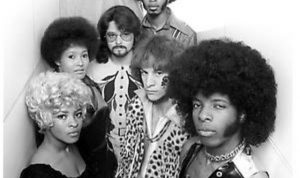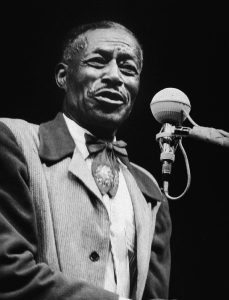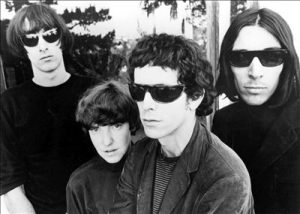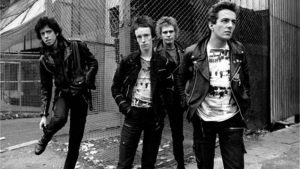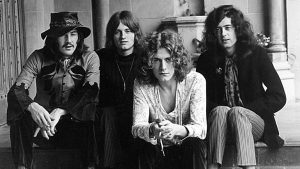Introduction: Some odds and ends
I want to get straight in to the next part of the list (part 1, part 2), so no long intro this time. But I just want to throw out a few random songs that I really like by people who didn’t make the list.
“Angel from Montgomery” by John Prine – one of the best-written ever country songs.
“There’s a Rugged Road” by Judee Sill – surprisingly catchy.
“Werewolves of London” by Warren Zevon – special place in my heart for this one, actually went looking for “Lee Ho Fook’s” in London once.
“Bukowski” by Modest Mouse – the indie kids love these guys: they wrote one great song, this.
“Heartbeats” by Jose Gonzalez – the soundtrack to a million quirky romantic comedies probably starring, and indeed loved by, Canadians.
“Screams in the Ears” by Bill Fay – best ever song about being generally grumpy at a party: sums up me at most parties.
“Courting Blues” by Bert Jansch – seems oddly creepy out of its original context.
“The Saturday Boy” by Billy Bragg – wish he’d spent his whole career singing songs like this instead of his vaguely embarrassing songs of socialist protest.
“Measuring Cups” by Andrew Bird – something about eggs or something, but enjoyable.
“Paris 1919” by John Cale – let’s face it, his only really essential solo track.
“Alice Practice” by Crystal Castles – computer games are close to my heart.
“Just Be Mine” by Graham Coxon – that whole album was pretty good actually.
“The Words that Maketh Murder” by PJ Harvey – the perennial Guardian-favourite is generally “not very me”, but I did like Let England Shake (2011) and especially this track.
“Books of Moses” by Alexander “Skip” Spence – in fact the whole Oar (1969) album is a work of obscure enigmatic wonderment.
While I’m at it, I will also choose this moment to reveal two big omissions: Leonard Cohen and that hero of Starbucks-feministas everywhere, Joni Mitchell. Reason? Both have always felt like “someone else’s music” to me. It feels like music the characters in Woody Allen films might listen to. It feels middle-aged and middle-classed: American college professors drinking wine and talking about identity politics. Let’s get on …
The List – Part 3: 50-26
50. The Prodigy
Genre: Big Beat, Breakbeat
Five to start you off: “Charley”, “Out of Space”, “No Good”, “Breathe”, “Omen”
Comment: This list has featured very few dance or pure electronic groups, because I was never properly into those scenes. I did grow up in the 1990s though, and to my mind Prodigy always stuck out as the one group who seemed to transcend their origins. I did also like Chemical Brothers, Underworld, and Massive Attack, and even for a time the likes of Fatboy Slim, but looking back Prodigy feel like the only ones I’d go out of my way to hear again. Experience (1992) is a rave album that can be enjoyed by someone who hates dancing and who would rather shoot you in the head than attend a rave. I appreciate the clever cultural references on tracks like “Charley” and “Fire”, and when I was 10 or 11, I fake-played a portable keyboard wearing shades as part of a band performing “Out of Space”. Prodigy always had killer, instantly recognisable singles like “No Good” on Music for the Jilted Generation (1994). The Fat of the Land (1996) saw them at their commercial peak, and at the height of Big Beat being a thing, with back-to-back UK numbers 1s: “Firestarter” and, a personal favourite of mine, “Breathe” – go and watch the video, I once had an experience similar to that after drinking whiskey after amoxicillin (not deliberate). They kind of disappeared and went off the boil after that but I did really love Invaders Must Die (2009), a sort of techno-revival album which kicks every ass from start to finish, particularly the title track, “Omen”, and “Piranha”.
49. Nirvana
Genre: Grunge, Alt Rock
Five to start you off: “About a Girl”, “Come As You Are”, “Lithium”, “Heart-Shaped Box”, “Where Did You Sleep Last Night?”
Comment: So far, this appears to be the part of the list in which I’m “dealing with” the 90s. Well, hey, y’know it’s Nirvana, big sludgy guitars, and raspy vocals barely concealing the bubblegum pop that lurked beneath – and before you say anything fans, I’m talking about Bleach (1989). I mean you can’t listen to something like “Sifting” and pretend that it’s not commercial and catchy, it definitely is! But there’s no shame in it, Nirvana were popular precisely because they were accessible, and the lyrics spoke to the real concerns of the spoiled, disaffected “why me” generation of 90s teenagers. It doesn’t really matter that it’s now hopelessly overplayed, Nevermind (1991) stands up as one of the decade’s best albums. In Utero (1993) completes the trifecta of essential studio albums, while – at least when I was an undergraduate – every single student seemed to own a copy of MTV Unplugged (1994). I will say that while I very much rate their output, Nirvana never really spoke to me; not then or now. I think maybe Nirvana was like a cathartic thing for its fans, something you shared in: shared pain, shared apathy, shared frustrations. I guess my sensibility has always been to shrink from such groupishness. And yet, isn’t Nirvana ultimately all about individualism?
48. Sly and the Family Stone
Genre: Soul, Funk
Five to start you off: “Stand!”, “Everyday People”, “Family Affair”, “Running Away”, “If You Want Me to Stay”
Comment: “Sly Stone’s protest”, writes one chap on Pitchfork correctly as it turns out, “was just a universal message wedded to hot dance records.” There’s not a whole lot else to say: the music holds up, it’s funky and fresh, and the themes of trying to stick together in an increasingly fractious America could not be more pertinent in 2016 when someone like Donald Trump can legitimately stand for the presidency on an essentially racist platform. As a rule, I don’t like overtly political music – I often find it didactic, trite, and embarrassing –but the four albums Sly put out in the late 60s and early 70s: Life (1968), Stand! (1969), There’s a Riot Goin’ On! (1971), and Fresh (1973) are surely among the most important ever recorded. They are marked by studied cynicism married to ambiguity, and therefore mostly escape the worst aspects of protest music.
47. Son House
Genre: Delta Blues
Five to start you off: “Death Letter Blues”, “John the Revelator”, “Pearline”, “Grinnin’ In Your Face”, “Shetland Pony Blues”
Comment: I have to admit that Son House has never been my favourite bluesman so it’s a little surprising that he’s found himself this high up, but in a genre marked by standards he represents a kind of bass-line standard. He also recorded far more than most of his contemporaries. His life is almost a cliché for a blues guy from that era: married five times, killed a man, spent time inside, played in the whiskey joints, apparently “taught” Robert Johnson, recorded in 1930 for Paramount before suffering a commercial decline, recorded for Alan Lomax at the Library of Congress sessions in 1941 before disappearing into obscurity, “re-discovered” in the 1960s by the revivalists … What marks out Son House is less his general performance or sound, but rather the darkness of his material. Take something like “Death Letter Blues”: a song in which the narrator receives a letter beckoning him to the mortuary, and then proceeds to look over the corpse – his original recording is one of the most powerful in the history of the blues. You want to start with Father of the Folk Blues (1965) and The Legendary 1941-1942 Recordings in Chronological Sequence (1970) before ranging back to the nine cuts he recorded in 1930.
46. Steely Dan
Years active: 1970s-present
Genre: Rock, Pop, Jazz
Five to start you off: “Kings”, “Reelin’ in the Years”, “Any Major Dude Will Tell You”, “Charlie Freak”, “Kid Charlemagne”
Comment: After what I said about Leonard Cohen and Joni Mitchell, some might be asking how the hell I could turn round and put an act like Steely Dan on the list with a straight face, because in some ways no band says “middle-class America” more than these guys. The reason is simple: they own it, and make music that speaks exactly and authentically to their suburban concerns as if Donald Fagen were a slightly hipper Paul Simon or else Billy Joel with an education. Naturally, I frown on the jazz excesses of some of their most praised work: I’d take the sharp pop writing of Can’t Buy a Thrill (1972) over the pretensions of Aja (1977) any day of the week. What I like about them can be glimpsed in one of their more famous songs, “Reelin’ in the Years” – incidentally, a song I’d nominate for “verses are way catchier than the chorus”:
Your everlasting summer
You can see it fading fast
So you grab a piece of something
That you think is gonna last
You wouldn’t know a diamond
If you held it in your hand
The things you think are precious
I can’t understand
There’s a latent bitterness here, one that can only come from real experience. We don’t quite know exactly who he is talking to, or about, but we recognise what he’s saying as coming out of the stuff of real life.
45. The Velvet Underground
Genre: Art Rock
Five to start you off: “All Tomorrow’s Parties”, “Venus in Furs”, “Sister Ray”, “Beginning to See the Light”, “The Murder Mystery”
Comment: Is the critical hype surrounding The Velvet Underground the biggest case of The Emperor’s New Clothes since Hans Christian Anderson wrote the tale in 1837? I don’t know but I’m not willing to be that one child in the crowd who cries out that the Emperor has nothing on. “Taste the whip, now bleed for me”.
44. Public Enemy
Genre: Hip-hop
Five to start you off: “Black Steel in the Hour of Chaos”, “Night of the Living Baseheads”, “Fight the Power”, “Welcome to the Terrordome”, “He Got Game”
Comment: Easily the most important hip-hop act in terms of cultural impact and political substance, Public Enemy are also one of the most sonically challenging. The Bomb Squad’s hellish collage of sound and fury, the aural equivalent of Picasso’s Guernica, forms a backdrop for Chuck D’s entirely uncompromising raps of black anger and Terminator X’s frantic scratching. Add to the chaotic mix, the clown prince Flava Flav, and you have a total one-off in music. The first four albums and the much underrated He Got Game (1998) should be required listening before anyone is allowed to listen to any other rap period. It took me years to get my head around the fact that Professor Griff and the “Security of the First World” (S1W) don’t actually rap or make any sounds on the albums at all (although Griff does start getting more vocal on the later, less vital works).
43. Devo
Genre: Post-Punk, New Wave
Five to start you off: “Jocko Homo”, “Uncontrollable Urge”, “(I Can’t Get No) Satisfaction”, “Whip It”, “Girl U Want”
Comment: Devo recorded my favourite ever cover version: “(I Can’t Get No) Satisfaction”. On the Rolling Stones version, when Mick Jagger is singing it, I imagine that he’s been banging a lot of chicks taking drugs and so on, but even in that swirl of hedonism he’s unable to get any satisfaction. On the jagged, jittery, almost robotic version by Devo, when Mark Mothersbaugh sings it, you imagine some bullied nerd on the very fringes of society, unable to score, unable to connect: it’s a completely different breed of alienation. If you aren’t familiar with Devo, I’d recommend watching the video for “Jocko Homo”; you will either think that is awesome or will wonder why I’ve taken you there. If you get the former reaction progress to Q: Are We Not Men? A: We Are Devo! (1978) (if nothing else check out “Uncontrollable Urge”) and Freedom of Choice (1980), and then branch out from there. Embrace sheer fun of it all.
42. The Clash
Genre: Punk, New Wave
Five to start you off: “1977”, “Rock the Casbah”, “Complete Control”, “Spanish Hell”, “Straight to Hell”
Comment: After the tumultuous calamity of Brexit in the UK and the somewhat scary rise of Donald Trump in the US, it feels like modern music could do with a band like The Clash again. One of the remarkable things about The Clash is that, for such a political and anti-establishment act, they are very accessible: they had good riffs, melodies, and hooks, as well as punkish aggression. Joe Strummer didn’t write songs of protest for the working man, he wrote them for people on the dole, people who found their traditional communities upbraided and overturned by a ruthless global economy: disenfranchised, scared, and desperate people who left the 1970s with scarcely even hope. It’s less a coherent political vision than it is a venting of frustration; the themes are well-worm: the rich against the poor, the young against the status quo, the wronged against the unjust. He’s a very clever lyricist at times, the wit is underrated: “But I believe in this – and it’s been tested by research / That he who fucks nuns will later join the church.” (“Death or Glory”). You want their four essential albums: The Clash (1977) (their only pure punk album), Give ‘Em Enough Rope (1978), London Calling (1979) (their masterpiece), and Combat Rock (1982) and something that collects all their singles. I’d leave the mammoth Sandinsta! (1980) for further exploration.
41. Joy Division / New Order
Genre: Post-Punk, New Wave, Synth
Five to start you off: “Shadowplay”, “Isolation”, “Age of Consent”, “Round & Round”, “Blue Monday”
Comment: Fans of either band will probably be appalled that I’ve conflated them here, but hear me out: 1. Apart from one change of personnel, it’s literally the same band: Ian Curtis, Peter Hook, Stephen Morris and Bernard Sumner was the original lineup. Curtis died, Sumner took over on vocals, and Gillian Gilbert came in on keyboards. 2. This is my list and I didn’t want them taking up two valuable spaces lower down when I could deal with them in one fairly high slot. Although they do sound pretty different eventually – Joy Division definitely a post-punk outfit who made cold, metallic music, New Order definitively New Wave drenched in synth – the continuity is Peter Hook’s thumping bass which will not be denied. Joy Division’s Unknown Pleasures (1979) and Closer (1980) are both classics. I think New Order were more of a singles act – and for my money I’d rate them well below Depeche Mode in the New Wave stakes – but at their best they made some pretty good tunes. I think actually it took them quite a bit of time to find their feet post-Joy Division and, perhaps controversially, in my view their only really essential album is Technique (1990). If you are going in cold with eitheir of these bands, I’d pick up the two Joy Division albums, and a singles collections for New Order possibly followed by Technique before more specialist exploration.
40. Led Zeppelin
Genre: Hard Rock, Blues-Rock
Five to start you off: “Dazed and Confused”, “Hats Off to (Roy) Harper”, “Black Dog”, “Houses of the Holy”, “Ten Years Gone”
Comment:
Seems a cliché to pick Led Zep, but they are really good, so I’ll try to keep it short. Led Zeppelin (1969): trippy; Led Zeppelin II (1969): rocky; Led Zeppelin III (1970): folky; Led Zeppelin IV (1971): hard; Houses of the Holy (1973): overrated; Physical Graffiti (1975): underrated.



